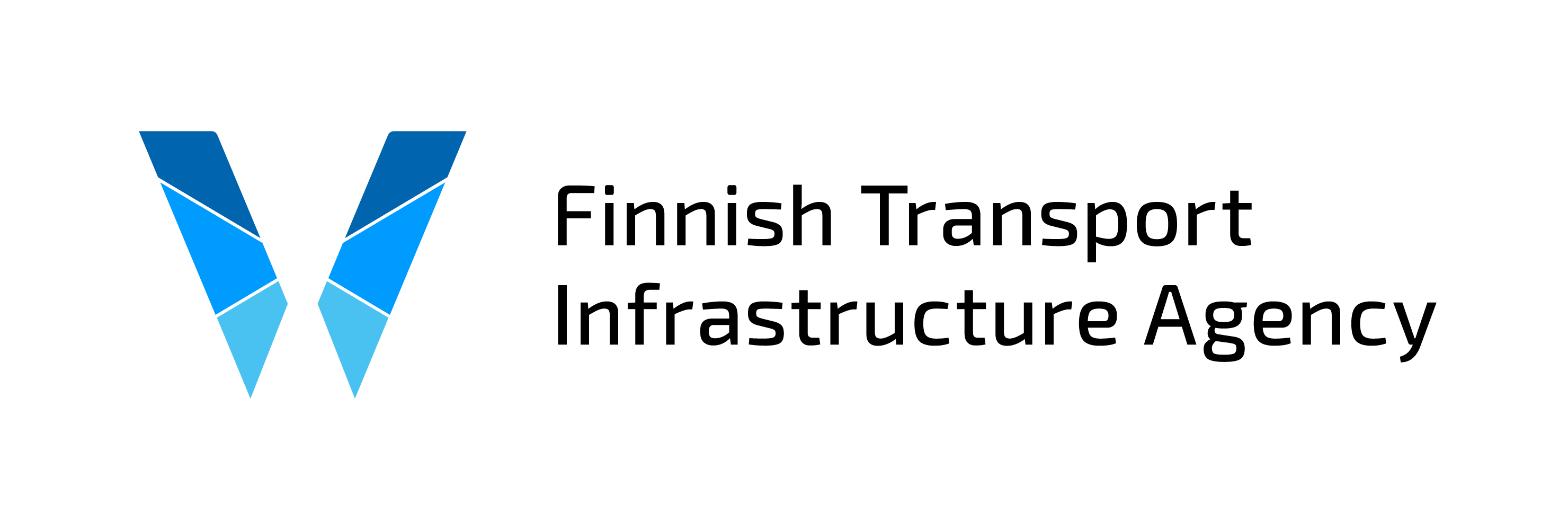Track access charges
Charging principles and services included in the basic infrastructure charge
The legal basis for track access charging is defined in the Rail Transport Act (1302/2018), Directive 2012/34/EU of the European Parliament and of the Council establishing a single European railway area, and Commission Implementing Regulation (EU) 2015/909.
The Finnish Transport Infrastructure Agency (FTIA) levies the basic infrastructure charge from railway undertakings in a fair and non-discriminatory manner for the use of minimum access package services. The unit rates of the basic charge are published in the Network Statement. The basic track infrastructure charge is based on those infrastructure costs that are directly incurred by railway operations.
The basic infrastructure charge covers the minimum access package services, which include:
a) processing requests for infrastructure capacity;
b) right to use the allocated infrastructure capacity;
c) use of the railway infrastructure, including track points and junctions;
d) train control, signalling, traffic control, dispatching and the communication and provision of infor-
mation on train movements;
e) connection to the infrastructure manager’s transmission network and use of electrical supply equip-
ment for traffic on electrified line sections;
f) information required to operate the services for which capacity has been allocated.
Basic infrastructure charge in 2026
Basic component of the basic infrastructure charge:
0,2005 cents/gross tonne-kilometre
Additional charge for the use of electric supply equipment:
0,0166 cents/gross tonne-kilometre
Basic infrastructure charge in 2027
Basic component of the basic infrastructure charge:
0,2054 cents/gross tonne-kilometre
Additional charge for the use of electric supply equipment:
0,0167 cents/gross tonne-kilometre
Charging principles of the FTIA railway network as of 1 January 2023
The charging of the Finnish Transport Infrastructure Agency’s (FTIA) railway network consists of charges levied for operating on the state-owned railway network and for the use of services, as well as penalties under the performance scheme. Pricing-related information is published in Chapter 5 of the FTIA Network Statement and in the methodology memorandum available on this page. The pricing is fair, non-discriminatory, and transparent. FTIA communicates openly about charging to all stakeholders.
FTIA levies a basic infrastructure charge, which represents the minimum level of charges required by legislation for operating on the railway network. In addition, charges are collected for shunting traffic control, use of the Ilmala yard infrastructure, and electricity transmission. FTIA also collects and pays penalties related to railway system disruptions in accordance with the performance scheme.
The unit rates of the basic infrastructure charge are reviewed regularly, particularly based on updated cost and traffic data and in line with international best practices. The base component of the basic infrastructure charge for all traffic is determined using statistical cost modelling, and the additional charge for electric traction supply is calculated using a subtraction method. The methodology for determining the basic infrastructure charge is documented in detail in a memorandum.
FTIA may assess the introduction of discounts and mark-ups to the basic infrastructure charge, investment charges, additional charges, and capacity reservation charges, as well as alternative methods for calculating the basic infrastructure charge.
FTIA may expand the charging of services (other than minimum access package services) to (1) cover the costs and ensure the maintenance of services, and/or (2) influence the use of services. The charging level of services may vary. Charges may not exceed FTIA’s actual costs.
FTIA collects cost and usage data related to services. This data is used for determining unit rates, setting charges, assessing the need for new services, evaluating service usage, and analysing the system-level impacts of charging on the transport system.
Service charging may be based on, for example, access charges per service facility, exclusive reservation of a facility or part thereof, or use of individual services.
Track access charges and service charges are subject to annual index adjustments.
FTIA ensures the governance and resourcing of pricing activities. Particular attention is paid to the sufficiency and quality of cost and traffic data used as the basis for charging.
The charging principles are updated regularly.
Documentation related to track access charging by FTIA
Network Statements 2026 and 2027 (track access charges in 2026 and 2027)
The costs of the electric supply equipment directly incurred by the operation of the train service (FTIA publications 59/2020, in Finnish with English summary)
Review of the econometric modelling of the marginal cost of using railway infrastructure (FTIA Thesis 8/2020, in Finnish with English summary)
Determining the basic infrastructure charge (FTIA Railway Network Statement 2027, Appendix 5.1)
